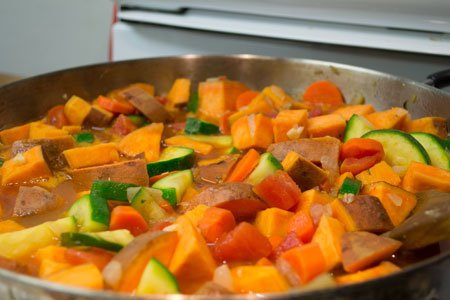February 1, 2016, not only marks the start of Black History Month, but for a Boston-based nonprofit food and nutrition organization, it’s the beginning of the fifth annual African Heritage & Health Week.
(Courtesy Photo)
Accara: Black-eyed Pea Fritters from West Africa
The week-long observance was founded by Oldways, an organization formed to promote healthy eating and drinking by developing programs for consumers. African Heritage & Health Week serves to guide individuals to good health through heritage by using what Oldways officials say are practical and positive programs grounded in science, tradition and real foods.
Spicy Chickpeas
“Baltimore residents can celebrate African Heritage & Health Week by cooking up an African heritage recipe in their home kitchens, hosting an African Heritage & Health Week event with the help of Oldways’ nutrition outreach materials, or trying out a new local, African heritage restaurant that features foods from the African Diaspora,” said Sarah McMackin, Oldways program manager for its African Heritage & Health Program.
In an effort to help observers find restaurants in their area, Oldways has a Dine-Around-Town list online at: www.oldwayspt.org/, as well as heritage recipes that can be made at home, according to McMackin.
Suggested African heritage recipes include those for Accara, which are crispy black-eyed pea fritters popular in West Africa; and chickpeas, which have played an important role in African cooking ever since they were first cultivated by ancient Egyptians.
There are also African heritage desserts including the popular “after-chop,” a fresh fruit salad with coconut, peanuts, and honey mixed together and loaded with flavor and nutrition which Oldways officials said makes an individual feel good about treating the sweet tooth after a meal.
Local residents can follow Oldways on social media and share, repost or display any African Heritage & Health Week posts, McMackin said.
“We’d love to see photos of African heritage cuisine from all of our followers,” she said, noting that individuals can use the hash tag #EatAfricanHeritage365 to share posts.
“The past four years has seen a steady increase in awareness and participation, with unique community-engaging events popping up all over the country,” McMackin said. “Last year, we saw potlucks, group restaurant outings, and educational seminars take place.”
A new “Ambassador Network” has been established this year and it’s comprised of teachers from the Oldways cooking class “A Taste of African Heritage.”The ambassadors have organized events in a number of cities including African Heritage Diet seminars at libraries and museums in St. Louis and Clemson, South Carolina; a class potluck in Houston and an information party in Lithonia, Georgia.
“The ultimate goal of African Heritage & Health Week is to help educate people about the flavors and nutrition of traditional African heritage foods and eating patterns. Many people are unaware that traditionally, African ancestors ate a plant-based, whole food diet that was extremely high in nutrition,” McMackin said.
“We are trying to change that. Many of today’s healthiest foods have their roots in African heritage like leafy greens, millet, watermelon, and flaxseeds, to name just a few. By reaching back to traditional ways, African-Americans and others can reconnect to a long lineage of healthy eating that has the power to heal, helping to claim health by reclaiming history,” she said.
For more information about African Heritage & Health Week or for African recipes, visit: www.oldwayspt.org/.


